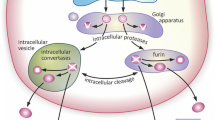Abstract
Intravenous anesthetics are known to cause amnesia, but the underlying molecular mechanisms remain elusive. To identify a possible molecular mechanism, we recently turned our attention to a key intracellular signaling pathway organized by a family of mitogen-activated protein kinases (MAPKs). As a prominent synapse-to-nucleus superhighway, MAPKs couple surface glutamate receptors to nuclear transcriptional events essential for the development and/or maintenance of different forms of synaptic plasticity (long-term potentiation and long-term depression) and memory formation. To define the role of MAPK-dependent transcription in the amnesic property of anesthetics, we conducted a series of studies to examine the effect of a prototype intravenous anesthetic propofol on the MAPK response to N-methyl-Daspartate receptor (NMDAR) stimulation in hippocampal neurons. Our results suggest that propofol possesses the ability to inhibit NMDAR-mediated activation of a classic subclass of MAPKs, extracellular signal-regulated protein kinase 1/2 (ERK1/2). Concurrent inhibition of transcriptional activity also occurs as a result of inhibited responses of ERK1/2 to NMDA. These findings provide first evidence for an inhibitory modulation of the NMDAR-MAPK pathway by an intravenous anesthetic and introduce a new avenue to elucidate a transcription-dependent mechanism processing the amnesic effect of anesthetics.
摘要
静脉麻醉剂可引起失忆, 但其潜在的分子机制尚未阐明。 最近, 为了确定其可能的分子机制, 我们将注意力转向一条关键的细胞内信号通路, 即丝裂原活化蛋白激酶(MAPKs)信号通路。 各种类型的突触塑型(长时程增强和长时程抑制)及记忆的形成和保持均离不开核内的转录事件。作为一条重要的突触至神经核的信号通路, MAPKs将细胞表面的谷氨酸受体与细胞核内的转录事件联系在一起。为确定MAPK依赖的转录事件在麻醉剂致失忆特性中的作用, 我们在海马神经元细胞中做了一系列研究以检测静脉麻醉剂丙泊酚可否改变MAPK对N-甲基-D-天门冬氨酸受体(NMDAR)信号的反应。结果提示丙泊酚可以抑制NMDAR激活经典MAPKs: 胞外信号调节蛋白激酶 1/2 (ERK1/2)。 丙泊酚抑制ERK1/2激活的同时还降低其转录活性。这些结果证明了 NMDAR-MAPK 通路可受静脉麻醉剂的抑制, 此为麻醉剂致失忆效应的研究从转录机制上开辟了一条新途径。
Similar content being viewed by others
References
Peyssonnaux C, Eychene A. The Raf/MEK/ERK pathway: new concepts of activation. Biol Cell 2001, 93: 53–62.
Wang JQ, Tang Q, Samdani S, Liu Z, Parelkar NK, Choe ES, Yang L, Mao L. Glutamate signaling to Ras-MAPK in striatal neurons: mechanisms for inducible gene expression and plasticity. Mol Neurobiol 2004, 29: 1–14.
Wang JQ, Fibuch EE, Mao L. Regulation of mitogen-activated protein kinases by glutamate receptors. J Neurochem 2007, 100: 1–11.
Perkinton MS, Ip JK, Wood GL, Crossthwaite AJ, Williams RJ. Phosphatidylinositol 3-kinase is a central mediator of NMDA receptor signalling to MAP kinase (Erk1/2), Akt/PKB and CREB in striatal neurons. J Neurochem 2002, 80: 239–254.
Krapivinsky G, Krapivinsky L, Manasian Y, Ivanov A, Tyzio R, Pellegrino C, Ben-Ari Y, Clapham DE, Medina I. The NMDA receptor is coupled to the ERK pathway by a direct interaction between NR2B and RasGRF1. Neuron 2003, 40: 775–784.
Sgambato V, Vanhoutte P, Pages C, Rogard M, Hipskind R, Besson MJ, Caboche J. In vivo expression and regulation of Elk-1, a target of the extracellular-regulated kinase signaling pathway, in the adult rat brain. J Neurosci 1998, 18: 214–226.
Mao L, Tang Q, Samdani S, Liu Z, Wang JQ. Regulation of MAPK/ERK phosphorylation via ionotropic glutamate receptors in cultured rat striatal neurons. Eur J Neurosci 2004, 19: 1207–1216.
Sweatt JD. Mitogen-activated protein kinases in synaptic plasticity and memory. Curr Opin Neurobiol 2004, 14: 311–317.
Thomas GM, Huganir RL. MAPK cascade signaling and synaptic plasticity. Nature Rev Neurosci 2004, 5: 173–183.
Malenka RC. The long-term potential of LTP. Nat Rev Neurosci 2003, 4: 923–926.
Yin JC, Wallach JS, Del Vecchio M, Wilder EL, Zhou H, Quinn WG, Tully T. Induction of a dominant negative CREB transgene specifically blocks long-term memory in Drosophila. Cell 1994, 79: 49–58.
Kozzin J, Mao L, Yang L, Arora A, Fibuch EE, Wang JQ. Inhibition of glutamatergic activation of extracellular signal-regulated protein kinases in hippocampal neurons by the intravenous anesthetic propofol. Anesthesiology 2006, 105: 1182–1191.
Sanou J, Ilboudo D, Goodall G, Bourdalle-Badie C, Erny P. Evaluation of cognitive functions after anesthesia with propofol. Ann Fr Anesth Reanim 1996, 15: 1155–1161.
Wei H, Xiong W, Yang S, Zhou Q, Liang C, Zeng BX, Xu L. Propofol facilitates the development of long-term depression (LTD) and impairs the maintenance of long-term potentiation (LTP) in the CA1 region of the hippocampus of anesthetized rats. Neurosci Lett 2002, 324: 181–184.
Takamatsu I, Sekiguchi M, Wada K, Sato T, Ozaki M. Propofolmediated impairment of CA1 long-term potentiation in mouse hippocampal slices. Neurosci Lett 2005, 389: 129–132.
Nagashima K, Zorumski CF, Izumi Y. Propofol inhibits longterm potentiation but not long-term depression in rat hippocampal neurons. Anesthesiology 2005, 103: 318–326.
Leslie K, Sessler DI, Schroeder M, Walters K. Propofol blood concentration and the Bispectral Index predict suppression of learning during propofol/epidural anesthesia in volunteers. Anesth Analg 1995, 81: 1269–1274.
Veselis RA, Reinsel RA, Feshchenko VA, Wronski M. The comparative amnestic effects of midazolam, propofol, thiopental, and fentanyl at equisedative concentrations. Anesthesiology 1997, 87: 749–764.
Tingley WG, Ehlers MD, Kameyama K, Doherty C, Ptak JB, Riley CT, Huganir RL. Characterization of protein kinase A and protein kinase C phosphorylation of the N-methyl-Daspartate receptor NR1 subunit using phosphorylation sitespecific antibodies. J Biol Chem 1997, 272: 5157–5166.
Wang JQ, Liu X, Zhang G, Parelkar NK, Arora A, Haines M, Fibuch EE, Mao L. Phosphorylation of glutamate receptors: a potential mechanism for the regulation of receptor function and psychostimulant action. J Neurosci Res 2006, 84: 1621–1629.
Kingston S, Mao L, Yang L, Arora A, Fibuch EE, Wang JQ. Propofol inhibits phosphorylation on N-methyl-D-aspartate receptor NR1 subunits in neurons. Anesthesiology 2006, 104: 763–769.
Vanhoutte P, Barnier JV, Guibert B, Pages C, Besson MJ, Hipskind RA, Caboche J. Glutamate induces phosphorylation of Elk-1 and CREB, along with c-fos activation, via an extracellular signal-regulated kinase-dependent pathway in brain slices. Mol Cell Biol 1999, 19: 136–146.
Rajadhyaksha A, Barczak A, Macias W, Leveque JC, Lewis SE, Konradi C. L-type Ca2+ channels are essential for glutamate-mediated CREB phosphorylation and c-fos gene expression in striatal neurons. J Neurosci 1999, 19: 6348–6359.
Yang L, Mao L, Tang Q, Samdani S, Liu Z, Wang JQ. A novel Ca2+-independent signaling pathway to extracellular signal-regulated protein kinase by coactivation of NMDA receptors and metabotropic glutamate receptor 5 in neurons. J Neurosci 2004, 24: 10846–10857.
Author information
Authors and Affiliations
Corresponding author
Rights and permissions
About this article
Cite this article
Fibuch, E.E., Wang, J.Q. Inhibition of the MAPK/ERK cascade: a potential transcription-dependent mechanism for the amnesic effect of anesthetic propofol. Neurosci. Bull. 23, 119–124 (2007). https://doi.org/10.1007/s12264-007-0017-y
Received:
Published:
Issue Date:
DOI: https://doi.org/10.1007/s12264-007-0017-y
Keywords
- glutamate
- NMDA
- long-term potentiation
- Elk
- cyclic AMP response element-binding protein
- c-fos proteins
- hippocampus
- propofol




